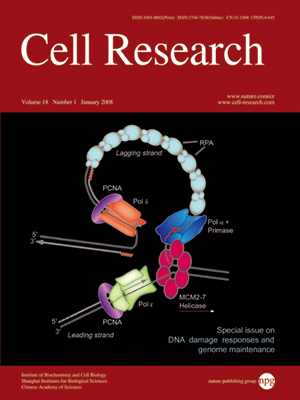
Volume 18, No 1, Jan 2008
ISSN: 1001-0602
EISSN: 1748-7838 2018
impact factor 17.848*
(Clarivate Analytics, 2019)
Volume 18 Issue 1, January 2008: 162-173
REVIEWS
Eukaryotic DNA damage tolerance and translesion synthesis through covalent modifications of PCNA
Parker L Andersen1, Fang Xu2 and Wei Xiao1
1Department of Microbiology and Immunology, University of Saskatchewan, Saskatoon, SK, Canada S7N 5E5, USA;
2Department of Biology, Ningxia Medical College, Yinchuan, Ningxia 750004, China
Correspondence: Wei Xiao(wei.xiao@usask.ca)
In addition to well-defined DNA repair pathways, all living organisms have evolved mechanisms to avoid cell death caused by replication fork collapse at a site where replication is blocked due to disruptive covalent modifications of DNA. The term DNA damage tolerance (DDT) has been employed loosely to include a collection of mechanisms by which cells survive replication-blocking lesions with or without associated genomic instability. Recent genetic analyses indicate that DDT in eukaryotes, from yeast to human, consists of two parallel pathways with one being error-free and another highly mutagenic. Interestingly, in budding yeast, these two pathways are mediated by sequential modifications of the proliferating cell nuclear antigen (PCNA) by two ubiquitination complexes Rad6-Rad18 and Mms2-Ubc13-Rad5. Damage-induced monoubiquitination of PCNA by Rad6-Rad18 promotes translesion synthesis (TLS) with increased mutagenesis, while subsequent polyubiquitination of PCNA at the same K164 residue by Mms2-Ubc13-Rad5 promotes error-free lesion bypass. Data obtained from recent studies suggest that the above mechanisms are conserved in higher eukaryotes. In particular, mammals contain multiple specialized TLS polymerases. Defects in one of the TLS polymerases have been linked to genomic instability and cancer.
Cell Research (2008) 18:162-173. doi: 10.1038/cr.2007-114; published online 24 December 2007
FULL TEXT | PDF
Browse 2005


